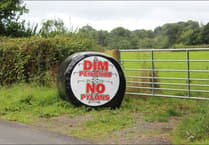THE Benjamin Netanyahu government evidently feels particularly stung by Ireland’s decision to support a petition at the international court of justice accusing Israel of genocide.
So much so that it’s closing its embassy in Dublin, despite having taken no such action against other countries - Spain, Bolivia, Colombia, Egypt, Mexico, Turkey, Chile and Libya - that have also joined the petition.
The announcement came as the deal toll of Palestinians killed in the 14-month war in Gaza approached 45,000, including more deaths over Christmas.
Five medical staff, including a paediatrician and two paramedics, at a hospital on the northern edge of Gaza died in an Israeli attack on Christmas Day, with at least another five people reported killed, and 20 injured, in strikes on Gaza City, the BBC reported.
Meanwhile, the father of a two-week-old Palestinian girl told how his baby daughter froze to death in a tent in Gaza - the third child in a week to die in similar conditions.
The Irish prime minister, Simon Harris, had earlier said on X: “Ireland is pro-peace, pro-human rights and pro-international law.”
As a relatively small country, it’s also not afraid to stand up and say so and, specifically, to take decisive action to demonstrate the fact.
Which, most regrettably, is more than can be said, so far, for Wales.
In November, this column argued that the Welsh government should not hesitate to align itself with the international court action, recognising that this is an issue so horrifying that vast-scale blood-letting and flattening of homes, hospitals, schools and public infrastructure in Gaza have for many people in Wales become too appalling to take on board, even remotely.
Politicians of all parties and none remained silent. In the face of carnage, Wales’s elected representatives looked the other way. As opposed to many members of the public, who have been involved in frequent vigorous protest.
So Frankly Speaking had another go, messaging 16 randomly selected members of the Senedd, from all parties, to see what they thought. Two replied.
Plaid Cymru’s Heledd Fychan, the South Wales Central regional member, pointed to her support for a Senedd motion put forward by Plaid South Wales West colleague Sioned Williams, which among other things calls on the Welsh government to ensure that all its activities, partnerships and procurement practices are fully aligned with the Well-being of Future Generations (Wales) Act 2015, and thus provide no support for companies or activities implicated in “unlawful occupation or military action.”
Good, but lacking the very necessary boldness of the Irish head-above-the-parapet position.
But for inimitable monosyllabic non-engagement my only other reply, from the newish Conservative leader and leader of the opposition, Darren Millar, stands out.
As with the other 14 Senedd members, I had asked him: do you believe Wales should support the petition at the international court of justice which accuses Israel of genocide, joining the eight other countries which have already done so?
His one-word reply: “No.”
Among the silent majority are first minister Eluned Morgan and Plaid leader Rhun ap Iorwerth. So are Labour and Plaid grassroots supporters, and the Tories’, really content with a heads-in-the-sand response to probably the most important humanitarian crisis of our time?
The planning farce over wind turbines
WAS Rebecca Evans, Wales’s economy secretary, pretending to be dim-witted when she brushed aside warnings by Plaid Cymru’s Luke Fletcher about the erosion of democracy inherent in new planning procedures over major energy projects? Or was this the real thing?
Commendably, Fletcher had just reminded the Senedd about the looming shadow of Big Brother in the matter of Labour’s proposed shredding of time-honoured planning processes when it comes to pushing through big wind and solar installations served by fleets of the mightiest pylons available.
This will be government-level we-know-best mentality overdosing on a range of stimulants.
Such so-called developments of national significance will bypass local planning authorities and in the process put any meaningful public or community involvement through the shredder.
Local decision-making will be out the window. Instead, a government planning inspector will examine applications and make recommendations to said government based on perceived planning merits and perceived national priorities.
Merits and priorities untested by way of public consultation and approval. Basically, Starmer-style enforcement swallowed whole by the Welsh government.
Luke Fletcher was simply spelling out this dive into unaccountable authoritarianism.
Enter Rebecca Evans with her baseless put-down.
Snootily, she tells Luke: “I’m afraid Plaid Cymru seems to have completely misunderstood the the regulations which are being debated today.”
Then the cajoling nonsense posing as a benign statement of the obvious: “The application and determination process doesn’t change at all with the delegation of determination to inspectors.”
What a pity Orwell isn’t around to appreciate this matchless Big Brotherism.




